- Home
- Michael Swanwick
The Best of Michael Swanwick
The Best of Michael Swanwick Read online
Subterranean Press 2008
The Best of Michael Swanwick Copyright © 2008 by Michael Swanwick.
All rights reserved.
“Introduction” Copyright © 2008 by Michael Swanwick.
“The Feast of Saint Janis” Copyright © 1980 by Michael Swanwick.
“Ginungagap” Copyright © 1980 by Michael Swanwick.
“Trojan Horse” Copyright © 1984 by Michael Swanwick.
“A Midwinter’s Tale” Copyright © 1988 by Michael Swanwick.
“The Edge of the World” Copyright © 1989 by Michael Swanwick.
“Griffin’s Egg” Copyright © 1991 by Michael Swanwick.
“The Changeling’s Tale” Copyright © 1994 by Michael Swanwick.
“North of Diddy-Wah-Diddy” Copyright © 1995 by Michael Swanwick.
“Radio Waves” Copyright © 1995 by Michael Swanwick.
“The Dead” Copyright © 1996 by Michael Swanwick.
“Mother Grasshopper” Copyright © 1997 by Michael Swanwick.
“Radiant Doors” Copyright © 1998 by Michael Swanwick.
“The Very Pulse of the Machine” Copyright © 1998 by Michael Swanwick.
“Wild Minds” Copyright © 1998 by Michael Swanwick.
“Scherzo with Tyrannosaur” Copyright © 1999 by Michael Swanwick.
“The Raggle Taggle Gypsy-O” Copyright © 2000 by Michael Swanwick.
“The Dog Said Bow-Wow” Copyright © 2001 by Michael Swanwick.
“Slow Life” Copyright © 2002 by Michael Swanwick.
“Legions in Time” Copyright © 2003 by Michael Swanwick.
“Triceratops Summer” Copyright © 2006 by Michael Swanwick.
“From Babel’s Fall’n Glory We Fled” Copyright © 2007 by Michael Swanwick.
Dust jacket Copyright © 2008 by Lee Moyer. All rights reserved.
Interior design Copyright © 2008 by Desert Isle Design, LLC.
All rights reserved.
Electronic Edition
ISBN
978-1-59606-350-1
Subterranean Press
PO Box 190106
Burton, MI 48519
www.subterraneanpress.com
Table of Contents
Copyright
Introduction
The Feast of Saint Janis
Ginungagap
Trojan Horse
A Midwinter’s Tale
The Edge of the World
Griffin’s Egg
The Changeling’s Tale
North of Diddy-Wah-Diddy
Radio Waves
The Dead
Mother Grasshopper
Radiant Doors
The Very Pulse of the Machine
Wild Minds
Scherzo with Tyrannosaur
The Raggle Taggle Gypsy-O
The Dog Said Bow-Wow
Slow Life
Legions in Time
Triceratops Summer
From Babel’s Fall’n Glory We Fled
Introduction
One autumn day half a lifetime ago, I was visiting my friend Jack Dann at his house in Binghamton, New York. This was long before he emigrated to Australia. He was in a nostalgic mood, and swept a hand toward the tidy shelves holding a copy of every book he’d ever written or had a story appear in. They covered half a wall. Many years earlier, he said, he’d visited Anne McCaffrey—this was before she’d moved to Ireland—and admired her assembled clutch of publications. She’d told him then that someday sooner than he expected, he’d have a similar set of shelves, and that they’d measure out his life.
“It’ll happen to you too,” Jack said. “They’re like a clock, ticking.”
At the time, Jack’s prediction seemed as simultaneously wonderful and ominous as an Arabian Nights tale.
Now I have my own set of shelves and when I look at them, I can see my life staring back at me. Thus, “The Feast of Saint Janis” and “Ginungagap,” aren’t just my first two published stories, but the only ones that saw print before that happy day in late 1980 when I married my wife, Marianne Porter. The next year I had the good fortune that both stories made it onto the Nebula ballot, and the even better fortune that they then both lost. I’ve known writers who won a major award right off the bat, and it took all the joy out of the awards process for them. Every year that they didn’t win another felt like a failure to live up to their initial promise.
Winning isn’t everything, and sometimes it isn’t even anything at all.
“Trojan Horse” has roots deep in my childhood. My father was an engineer for General Electric’s aerospace division, and he used to bring home the most wonderful publicity handouts. One day, he gave me an artist’s rendering of what a GE lunar colony would look like, shown from the interior of a glass-domed crater. There was a black sky overhead and happy people strolling amid terraced gardens on the crater’s inner slopes. The future never looked better. It was pretty much inevitable that someday I’d write about that colony.
“A Midwinter’s Tale” was inspired by a show of Marc Chagall’s paintings at the Philadelphia Museum of Art. It’s one of my favorite stories and an almost-direct gift from the city in which I’ve spent most of my adult life. “The Edge of the World,” however, was based on my senior year of high school in Seven Pines, Virginia. 1968 was a terrifying time to be young. The assassination of Martin Luther King and the resulting arrest of every black student from my school in the riots that followed was only one of many horrifying events that washed through my life that year. Adolescence is hell. I swore that I would remember how it was and write about it someday. Finally I did.
I wrote “Griffin’s Egg” because I was about to start on my first fantasy novel, The Iron Dragon’s Daughter, and knew that I’d be a way from science fiction for years. Rather than find myself using stale ideas when I returned, I threw in every hard-SF invention I’d been saving up for future use. When I came to write the nuclear war, however, the thought of a classic East-West confrontation between the US and the USSR—which everyone had been predicting for all my life—was so damned boring, I just couldn’t do it. Which turned out to be a good thing because by the time the book came out (it was part of a series of hardcover novellas commissioned by Century Legend), the Soviet Union had fallen and great swaths of speculative fiction were swept into the dustbin of history.
“The Changeling’s Tale” is as close to autobiographical as anything I’ve ever written. When I was young, I ran off with the elves to become a writer. And I’ve never looked back.
Years of pleasant incubation went into “North of Diddy-Wah-Diddy,” mostly in the form of daydreaming while staring out the window of the train to New York City whenever I went to hobnob with my editors. I still enjoy the trip, but I must confess that I miss the sight of giant centaurs floundering through the toxic marshes of the Fresh Kill Landfill.
“Radio Waves” is set in my neighborhood of Roxborough. The telephone lines in the opening scene run right up my street and the red lights of the Seven Sisters blink benignly down upon me at night. At one point Cobb climbs through my house and sees me sitting on the couch, watching TV. “The Dead,” however, is a New York City story, inspired by a show of oil paintings by an old-school American Marxist. My family comes from the Big Apple, and I have many fond and enduring memories of visiting relatives there as a child.
I almost never start a story without knowing how it’s going to end, but “Mother Grasshopper” is one of the rare exceptions. It bubbled up from the hindbrain and I had no idea what it was about until two or three pages before the end. All the place names, incidentally, are towns and cities in Pennsylvania.
Shortly after “Radiant Doors” came out, one of my Clarion stu
dents dropped by my house, along with his fiancé, to invite Marianne and me to their wedding. His wife-to-be was a rabbi and she took Marianne aside and asked her how she could bear to sleep next to me, knowing I had such things in my head.
Marianne smiled and said, “Oh, they’re not in his head anymore. They’re in yours.”
Nevertheless, the wedding was lovely, as all weddings should be. There was a klezmer band at the reception afterwards and I danced until I could dance no more.
Almost two decades after my first experience losing a Nebula, “The Very Pulse of the Machine” won a Hugo. By then, I’d lost track of how many Nebulas and Hugos I’d been nominated for and lost (okay, yes, I am bragging here, a little), and was able to accept with pure, unalloyed joy.
I have a particular fondness for “Wild Minds.” It dropped into my hands in 1995, during Intersection, the first Worldcon held in Glasgow. I was staying in a cheap B&B high up on Renfrew Street, from which I could see the M8 motorway, a classic of misguided urban planning, cutting through the city like a scar, with abandoned buildings like dead flesh to either side of it. On a panel I said that we’d best embrace neural enhancement with extreme care lest it prove to be an M8 motorway right through the brain. Thus was born a story that I hope says something a little more nuanced than what one usually hears about the Catholic faith in which I was raised.
“Scherzo With Tyrannosaur” was written as a rough sketch for Bones of the Earth, to work out the mechanics of time travel and the politics of in chrono paleontology. I was so pleased with it that I later rewrote it with a totally different plot, set it in a different part of the Cretaceous, replaced the tyrannosaur with plesiosaurs, and used it as a chapter in the novel. If you read the book you’ll see what I mean. It won my second Hugo.
“The Raggle Taggle Gypsy-O” was the result of a reading Ellen Kushner gave at a local bookstore. After the event, she hit me up for a contribution to a planned but ultimately doomed anthology of stories based on folk ballads. Nothing leapt to mind, but since Ellen is a good friend, I said I’d give it a try. So on the drive home, I said to Marianne, “Okay, here’s an element for a story—a panel van filled with velociraptors. Give something else that’s off the wall.”
Without hesitating, she said, “A picnic basket full of dead puppies.”
“I can write this sucker!” I crowed.
“The Dog Said Bow-Wow” is probably my single most popular story, due entirely to the characters of Darger and Surplus. I was word-doodling one day, and they simply showed up. After which they insinuated themselves into my life, my career, and (I’m guessing) my ultimate reputation. I’ve written three full-scale stories and four connected short-shorts about the rogues to date, and I’ve just recently begun a novel for them. The story won my third Hugo.I took a big chance with “Slow Life,” writing hard science fiction about Titan at a time when the Cassini-Huygens probe was en route to Saturn. Subsequent radar mapping of Titan’s surface showed it to be very much the way I described it. No credit for that goes to me, however. I was simply extrapolating from what NASA’s scientists had said were their best guesses. Turns out they were right. The story won my fourth Hugo.
“Legions in Time” was an homage to A. E. Van Vogt’s “Recruiting Station,” which was a seminal work for me. It was the first SF story whose author’s name I bothered to remember, and one of a handful which convinced me I wanted to become a writer. I didn’t mean for it to win a Hugo. But it did. My fifth in six years. You’d think I’d be tired of the things by then. But I wasn’t.
I grew up in Winooski, Vermont, the only town in Vermont with no small-town charm whatsoever. It was a mill town before the money went away, and the kids from Burlington, across the river, called those who lived there “river rats,” and threw rocks at us. Nevertheless, there’s a lot of good things about Vermont, and almost all of them are people. “Triceratops Summer” is about those people.
Finally, there’s “From Babel’s Fall’n Glory We Fled…” This is mymost recent story, and I have no idea what images it will conjure up in years to come. Perhaps the memory of me banging out this introduc-tion and trying to find something to say about it? It’ll be interesting tofind out.
This book took me more than a quarter of a century to write. It will always be a landmark volume on my growing shelf of books. If I can keep it up for another twenty-seven years, my career is already half-spent. If not…well, not. I wrote these stories as best I could, and with the hope that they would endure. But whether they do or not is out of my hands. Once a story is published, it leaves the writer’s control. These stories don’t belong to me anymore.
They belong to you. I hope you like them.
The Feast of Saint Janis
Take a load off, Janis,
And
You put the load right on me.
—THE WAIT (TRAD.)
Wolf stood in the early morning fog watching the Yankee Clipper leave Baltimore harbor. His elbows rested against a cool, clammy wall, its surface eroded smooth by the passage of countless hands, almost certainly dating back to before the Collapse. A metallic grey sparkle atop the foremast drew his eye to the dish antenna that linked the ship with the geosynchronous Trickster seasats it relied on to plot winds and currents.
To many the wooden Clipper, with its computer-designed hydrofoils and hand-sewn sails, was a symbol of the New Africa. Wolf, however, watching it merge into sea and sky, knew only that it was going home without him.
He turned and walked back into the rick-a-rack of commercial buildings crowded against the waterfront. The clatter of hand-drawn carts mingled with a mélange of exotic cries and shouts, the alien music of a dozen American dialects. Workers, clad in coveralls most of them, swarmed about, grunting and cursing in exasperation when an iron wheel lurched in a muddy pothole. Yet there was something furtive and covert about them, as if they were hiding an ancient secret.
Craning to stare into the dark recesses of a warehouse, Wolf collided with a woman clad head to foot in chador. She flinched at his touch, her eyes glaring above the black veil, then whipped away. Not a word was exchanged.
A citizen of Baltimore in its glory days would not have recognized the city. Where the old buildings had not been torn down and buried, shanties crowded the streets, taking advantage of the space automobiles had needed. Sometimes they were built over the streets, so that alleys became tunnelways, and sometimes these collapsed, to the cries and consternation of the natives.
It was another day with nothing to do. He could don a filter mask and tour the Washington ruins, but he had already done that, and besides the day looked like it was going to be hot. It was unlikely he’d hear anything about his mission, not after months of waiting on American officials who didn’t want to talk with him. Wolf decided to check back at his hostel for messages, then spend the day in the bazaars.
Children were playing in the street outside the hostel. They scattered at his approach. One, he noted, lagged behind the others, hampered by a malformed leg. He mounted the unpainted wooden steps, edging past an old man who sat at the bottom. The old man was laying down tarot cards with a slow and fatalistic disregard for what they said; he did not look up.
The bell over the door jangled notice of Wolf’s entry. He stepped into the dark foyer.
Two men in the black uniforms of the political police appeared, one to either side of him. “Wolfgang Hans Mbikana?” one asked. His voice had the dust of ritual on it; he knew the answer. “You will come with us,” the other said.
“There is some mistake,” Wolf objected.
“No, sir, there is no mistake,” one said mildly. The other opened the door. “After you, Mr. Mbikana.”
The old man on the stoop squinted up at them, looked away, and slid off the step.
The police walked Wolf to an ancient administrative building. They went up marble steps sagging from centuries of footscuffing, and through an empty lobby. Deep within the building they halted before an undistinguished-looking door. “You
are expected,” the first of the police said.
“I beg your pardon?”
The police walked away, leaving him there. Apprehensive, he knocked on the door. There was no answer, so he opened it and stepped within.
A woman sat at a desk just inside the room. Though she was modernly dressed, she wore a veil. She might have been young; it was impossible to tell. A flick of her eyes, a motion of one hand, directed him to the open door of an inner room. It was like following an onion to its conclusion, a layer of mystery at a time.
A heavyset man sat at the final desk. He was dressed in the traditional suit and tie of American businessmen. But there was nothing quaint or old-fashioned about his mobile, expressive face or the piercing eyes he turned on Wolf.
“Sit down,” he grunted, gesturing toward an old overstuffed chair. Then: “Charles DiStephano. Controller for Northeast Regional. You’re Mbikana, right?”
“Yes, sir.” Wolf gingerly took the proffered chair, which did not seem all that clean. It was clear to him now; DiStephano was one of the men on whom he had waited these several months, the biggest of the lot, in fact. “I represent—”
“The Southwest Africa Trade Company.” DiStephano lifted some documents from his desk. “Now this says you’re prepared to offer—among other things—resource data from your North American Coyote landsat in exchange for the right to place students in Johns Hopkins. I find that an odd offer for your organization to make.”
“Those are my papers,” Wolf objected. “As a citizen of Southwest Africa, I’m not used to this sort of cavalier treatment.”
“Look, kid, I’m a busy man, I have no time to discuss your rights. The papers are in my hands, I’ve read them, the people that sent you knew I would. Okay? So I know what you want and what you’re offering. What I want to know is why you’re making this offer.”
Wolf was disconcerted. He was used to a more civilized, a more leisurely manner of doing business. The oldtimers at SWATC had warned him that the pace would be different here, but he hadn’t had the experience to decipher their veiled references and hints. He was painfully aware that he had gotten the mission, with its high salary and the promise of a bonus, only because it was not one that appealed to the older hands.

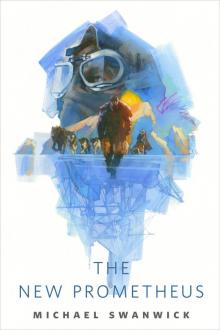 The New Prometheus
The New Prometheus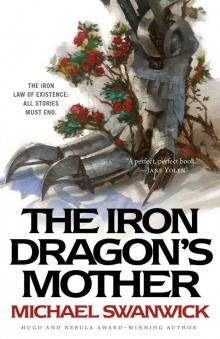 The Iron Dragon’s Mother
The Iron Dragon’s Mother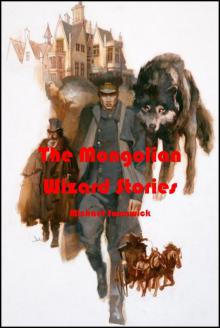 The Mongolian Wizard Stories
The Mongolian Wizard Stories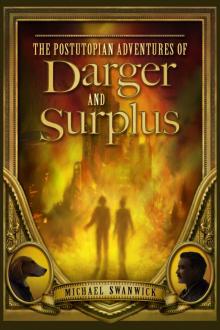 The Postutopian Adventures of Darger and Surplus
The Postutopian Adventures of Darger and Surplus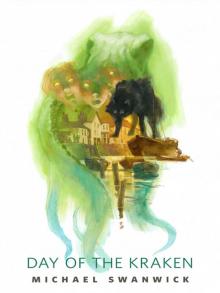 Day of the Kraken
Day of the Kraken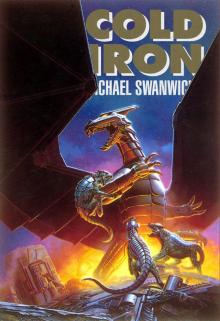 Cold Iron
Cold Iron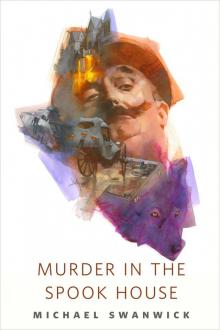 Murder in the Spook House: A Tor.com Original
Murder in the Spook House: A Tor.com Original Radio Waves
Radio Waves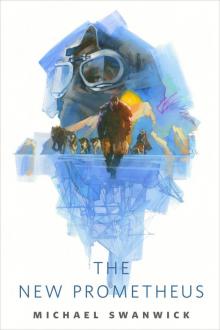 The New Prometheus: A Tor.com Original
The New Prometheus: A Tor.com Original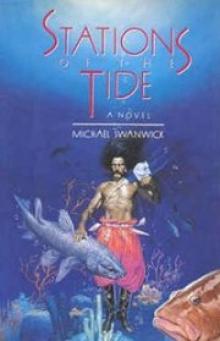 Stations of the Tide
Stations of the Tide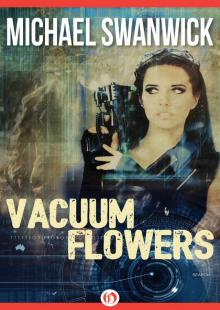 Vacuum Flowers
Vacuum Flowers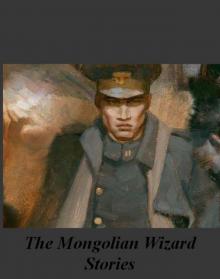 The Mongolian Wizard Stories (online stories 1-7)
The Mongolian Wizard Stories (online stories 1-7)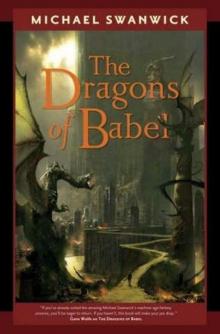 The Dragons of Babel
The Dragons of Babel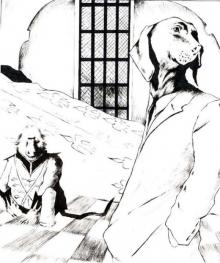 The Dog Said Bow-Wow
The Dog Said Bow-Wow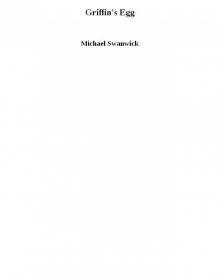 Griffin's Egg
Griffin's Egg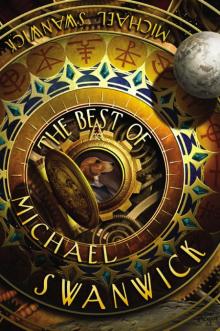 The Best of Michael Swanwick
The Best of Michael Swanwick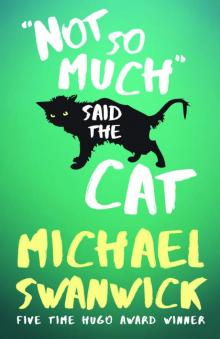 Not So Much, Said the Cat
Not So Much, Said the Cat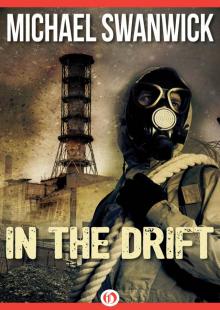 In the Drift
In the Drift Vacumn Flowers
Vacumn Flowers Slow Life
Slow Life The Wisdom Of Old Earth
The Wisdom Of Old Earth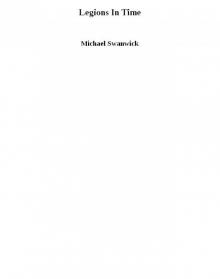 Legions In Time
Legions In Time Scherzo with Tyrannosaur
Scherzo with Tyrannosaur The Year's Best Science Fiction (2008 Edition)
The Year's Best Science Fiction (2008 Edition)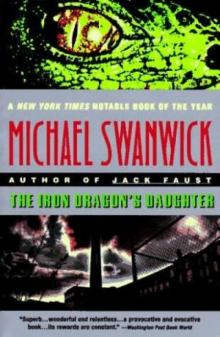 The Iron Dragon's Daughter
The Iron Dragon's Daughter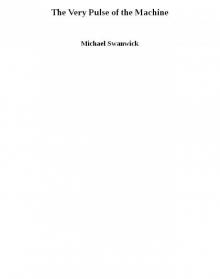 The Very Pulse of the Machine
The Very Pulse of the Machine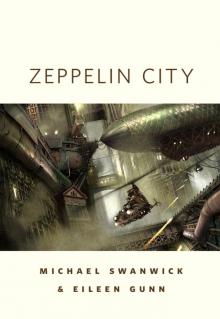 Zeppelin City
Zeppelin City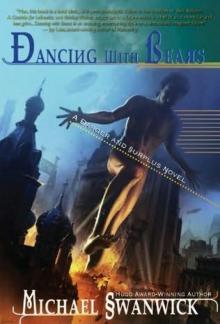 Dancing with Bears
Dancing with Bears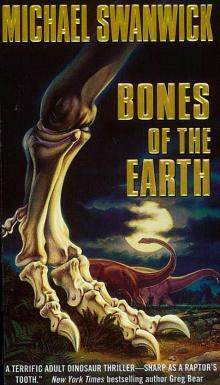 Bones of the Earth
Bones of the Earth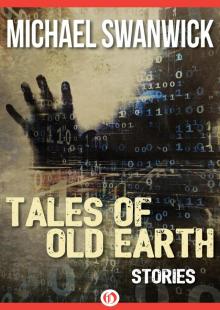 Tales of Old Earth
Tales of Old Earth Trojan Horse
Trojan Horse Radiant Doors
Radiant Doors